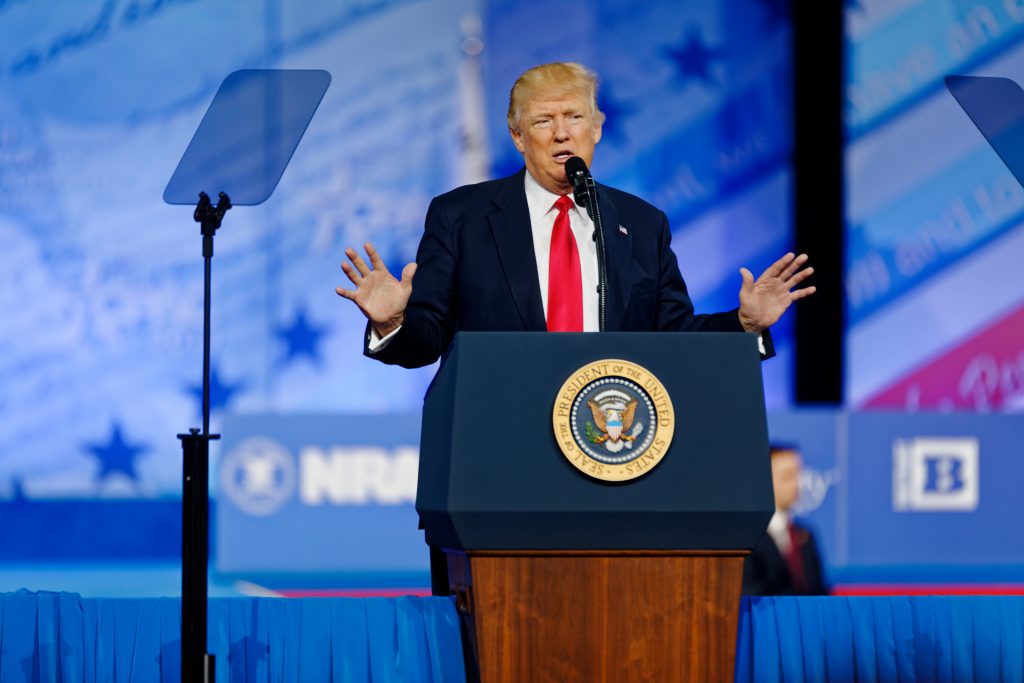Trump admin’s full budget proposal makes clear their intent to end federal support for transit construction
The Trump administration released their full budget proposal for 2018, ending any possible uncertainty about their belief that highway projects are always inherently in the national interest, transit of any type is explicitly a local concern, and leveraging greater local and state investment in transportation is not a trend to be encouraged.

Flickr photo by Michael Vadon – https://www.flickr.com/photos/80038275@N00/32744150430/
Update (5/24/17): Comments from Seattle added. In the full budget proposal from the White House, released this morning, the administration fleshed out the specifics of their “skinny budget” proposal from back in March. In this longer document that now includes line-item amounts for individual programs, the administration calls to end the TIGER grant program, cut all funding for new transit construction (other than projects that already have federal funding agreements in hand), and terminate the funding for long-distance passenger rail.
Members-only content
If you are an active T4America member, please log in to read the exclusive content hidden here. There are numerous benefits to membership — join today.
The administration reiterates their belief that transit is just a minor, local concern.
“Future investments in new transit projects would be funded by the localities that use and benefit from these localized projects,” they write, making it clear that they see no benefit in providing grants to cities of all sizes to build new bus rapid transit or rail lines, or expand existing, well-used lines so they can carry more passengers.
Unfortunately, they provide an extremely misguided justification for eliminating this funding.
Several major metropolitan regions have recently passed multi-billion dollar revenue measures to fund transit projects, and the Administration believes that is the most appropriate way to fund transit expansion and maintenance efforts. Localities are better equipped to scale and design infrastructure investments needed for their communities. Several major metropolitan areas, including Denver, Los Angeles, and Seattle, have already begun to move in this direction by asking residents to approve multi-billion dollar bond measures to speed the delivery of highway and transit investments. These regions realize waiting for Federal grant funding is not the most efficient way to meet their local transportation needs.
They’ve taken note of the positive trend of voters approving scores of ballot measures to raise taxes or fees to invest in transit, but have sorely mistaken that trend to mean that federal funding is no longer necessary and that these metro regions can make these ambitious projects happen all on their own.
We were wondering how the local leaders from Seattle, Los Angeles or Denver felt about being used as examples for why federal transit funding is no longer needed, so we reached out and asked a few for their thoughts.
Here’s Denny Zane with Move LA, the organization that led the grassroots effort to pass last year’s successful ballot measure in Los Angeles. (Mr. Zane is also a member of T4America’s Advisory Board.)
It is shocking that the Trump administration would play so fast and loose with such a longstanding and effective local-federal partnership to build transportation infrastructure — and to call out for abuse cities in western states simply because we took that partnership seriously. Yes, we have each gained the support of our local voters — Americans all — for investment in our transportation infrastructure. We were successful in part because we could assure them that our larger, more significant projects like the Wilshire subway, or the Sepulveda pass light rail, or the West Santa Ana light rail would all be good candidates for federal partnerships. Suddenly, without notice, the federal partner wants to pack it in. This is no way to unite the nation.
In Seattle, voters approved over $27 billion for transit at the ballot box last November. Seattle Department of Transportation director Scott Kubly made it clear that those voters were counting on using those dollars to leverage federal transit grants:
We are incredibly disappointed that President Trump’s budget proposal cuts infrastructure funding and is totally out of step with his administration’s rhetoric promising to increase infrastructure investments. He needs to put his money where his mouth is. Seattle voters have done their part. They have stepped up to provide local dollars to leverage federal resources. Our local funds are meant to complement federal investments, not replace them. His proposal slashes important city initiatives. We will work closely with our coalition, community partners and congressional leadership to ensure continued support for the Seattle’s transportation priorities.
In their justification for eliminating all funding for the extremely popular TIGER program, the administration describes all of the benefits as local, and direct the towns, cities or states seeking TIGER grants to other ill-suited federal programs. As we wrote back in March:
The administration blithely suggested in their proposal that local communities instead turn to other programs that are explicitly designed not to meet same needs as TIGER. ‘DOT’s Nationally Significant Freight and Highway Projects grant program, authorized by the FAST Act of 2015, supports larger highway and multimodal freight projects with demonstrable national or regional benefits. This grant program is authorized at an annual average of $900 million through 2020’ Well, sure, but only $100 million of that $900 million in any year can be used on projects that aren’t on the national freight highway network, so if your project is multimodal or otherwise not on a key national highway, you’re probably out of luck.
What about that “big” infrastructure package?
People from across the political spectrum were energized by candidate Trump’s promises to invest in infrastructure; excitement that ramped up after inauguration as Trump continued talking about a $1 trillion infrastructure package. Aside from the dissonant and jarring promises to invest in infrastructure while proposing to take an axe to vital transportation programs that support smart investments today, these promises have been slowly downgraded.
After starting with the mind-bending $1 trillion number, it was soon revealed to be an anticipated $1 trillion in total economic benefit (or combined investment/financing, including private dollars, depending on who was being quoted) with a total direct investment of around $200 billion. That’s nothing to sneeze at though — $200 billion would be a little over four times current federal surface transportation spending in any given year.
Today, those promises are further laid bare by this budget, as the $200 billion is revealed to be the total amount invested over ten years, with just a paltry $5 billion extra included in 2018. (The amounts are reported to be higher in later years.)
$5 billion is just 0.5 percent of 1 trillion dollars. Though if you want to be as charitable as possible and go with $200 billion as the number for the total direct federal investment, then 2.5 percent of the administration’s promised infrastructure investment is included in their budget for this upcoming year.
“Our nation’s infrastructure serves as the backbone for economic growth and prosperity,” We said back in March when the preliminary budget outline was released. Few details have changed since, and just like the outline did, this full budget “falls short of prioritizing investment in the local communities that are the basic building block of the national economy.”
UPDATE: Geoff Anderson, President and CEO of Smart Growth America, issued a statement on the budget. (T4America is a program of Smart Growth America.)
This budget ignores why communities need federal community development and transportation programs. It’s not just that they need money or innovative tools — which, for the record, they do. They also need a reliable partner who can support their work, not austerity measures that punish them for taking action.
If the federal government quits being that partner — which this budget absolutely implies — it’s going to cause lasting damage to American communities at a time when they need greater security and opportunity, not less. Trump promised these very things, but this budget is a reversal on that promise. We urge Congress to reject this austerity budget and create a budget that reinvest and rebuilds America for the future.



















Pingback: Today’s Headlines – Streetsblog St. Louis
Pingback: Budget Fight 2017 & Its Environmental Consequences For Transit And Clean Energy | Ethan Elkind
Pingback: ALERT: Trump 2018 Budget Proposal Takes Aim at Public Transit - Reconnect Rochester works to promote transportation choices that enable a more vibrant and equitable community in the Rochester, NY region.